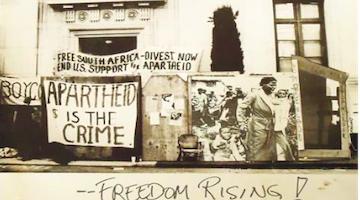“This is a storied victory for Debbie and her family, and the Move organization.”
The first member of a group of black radicals known as the Move Nine who have been incarcerated, they insist unjustly, for almost 40 years for killing a Philadelphia police officer has been released from prison.
Debbie Sims Africa, 61, walked free from Cambridge Springs prison in Pennsylvania on Saturday, having been granted parole. She was 22 when with her co-defendants she was arrested and sentenced to 30 to 100 years for the shooting death of officer James Ramp during a police siege of the group’s communal home on 8 August 1978.
She emerged from the correctional institution to be reunited with her son, Michael Davis Africa Jr, to whom she gave birth in a prison cell in September 1978, a month after her arrest.
“This is huge for us personally,” Sims Africa told the Guardian, speaking from her son’s home in a small town on the outskirts of Philadelphia where she will now live.
“She was 22 when with her co-defendants she was arrested and sentenced to 30 to 100 years for the shooting death of officer James Ramp.”
Davis Africa, 39, who was separated from his mother at less than a week old and has never spent time with her outside prison, said they were coming to terms with being reunited after almost four decades.
“Today I had breakfast with my mother for the first time,” he said. “There’s so much we haven’t done together.”
The release of Debbie Sims Africa is a major breakthrough regarding the ongoing incarceration of large numbers of individuals involved in the black liberation movement of the late 1960s and 1970s who are now growing old behind bars. At least 25 men and women belonging to Move or the former Black Panther party remain locked up, in some cases almost half a century after their arrests.
Sims Africa’s release also addresses one of the most hotly contested criminal justice cases in Philadelphia history. The nine were prosecuted together following a police siege of their headquarters in Powelton Village at the orders of Philadelphia’s notoriously hardline mayor and former police commissioner, Frank Rizzo.
“Today I had breakfast with my mother for the first time.”
Move, which exists today, regarded itself as a revolutionary movement committed to a healthy life free from oppression or pollution. In the 1970s it was something of a cross between black liberationists and early environmental activists. Its members all take “Africa” as their last name, to signal that they see each other as family.
Hundreds of police officers, organized in Swat teams and armed with machine guns, water cannons, teargas and bulldozers, were involved in the siege, which came at the end of a long standoff with the group relating to complaints about conditions in its premises. Two water cannon and smoke bombs were unleashed. The Move residents took refuge in a basement.
Sims Africa was eight months pregnant and was carrying her two-year-old daughter, Michelle. “We were being battered with high-powered water and smoke was everywhere,” she said. “I couldn’t see my hands in front of my face and I was choking. I had to feel my way up the stairs to get out of the basement with my baby in my arms.”
“Move regarded itself as a revolutionary movement committed to a healthy life free from oppression or pollution.”
Shooting broke out and Ramp was killed by a single bullet. Prosecutors alleged that Move members fired the fatal shot and charged Sims Africa and the other eight with collective responsibility for his death.
Eyewitnesses, however, gave accounts suggesting that the shot may have come from the opposite direction to the basement, raising the possibility that Ramp was accidentally felled, by police fire. After the raid was over, weapons were found within the property. None were in operative condition.
In 1985, Philadelphia authorities carried out an even more controversial and deadly action against the remaining members of Move. A police helicopter dropped an incendiary bomb on to the roof of its then HQ in west Philadelphia, killing six adults including the group’s leader, John Africa, and five of their children.
That incident continues to have the distinction of being the only aerial bombing by police carried out on US soil.
At Sims Africa’s trial, no evidence was presented that she or the three other women charged alongside her had brandished or handled firearms during the siege. Nor was there any attempt on the part of the prosecution to prove that they had had any role in firing the shot that killed Ramp.
Sims Africa has had an unblemished disciplinary record in prison for the past 25 years. The last claim of misconduct against her dates to 1992.
“Ramp was accidentally felled, by police fire.”
Her attorneys presented the parole board with a 13-page dossier outlining her work as a mentor to other prisoners and as a dog handler who trains puppies that assist people with physical and cognitive disabilities. The dossier includes testimony from the correctional expert Martin Horn, who reviewed her record and concluded it was “remarkable”.
Horn said Sims Africa had “chosen to be a rule-abiding individual with the ability to be a productive, law-abiding citizen if she is released. I see a record of growing maturity, improved judgment and the assumption of personal responsibility. I do not believe that Debbie Sims is today a threat to the community.”
Sims Africa’s lawyer, Brad Thomson, commended the parole board for “recognizing that she is of exceptional character and well-deserving of parole. This is a storied victory for Debbie and her family, and the Move organization, and we are hoping it will be the first step in getting all the Move Nine out of prison.”
The release of Sims Africa comes less than two months before the 40th anniversary of the siege. Commemorative events are being held in Philadelphia, organized by Move, on 5 and 11 August.
The release of Sims Africa is bittersweet, however. Two of the nine have died in prison -- another female inmate, Merle Austin Africa, in March 1998, and Phil Africa in January 2015.
“Two of the nine have died in prison.”
Also bittersweet is the fact that Sims Africa went up for parole at exactly the same time, and on exactly the same terms, as the other two remaining Move Nine women – Janine Phillips Africa and Janet Hollaway Africa. They were both denied parole and will have to wait until May 2019 to try again.
Thomson said the disparity in the parole board’s decision was “very surprising”, given that the Philadelphia district attorney’s office that carried out the original trial prosecution had written letters supporting parole for all three. The parole board gave what the lawyer said were “boilerplate justifications” for the denial of Phillips Africa and Hollaway Africa, saying they displayed “lack of remorse”.
Debbie Sims Africa’s husband also remains behind bars. Mike Davis Africa Sr is next up before the parole board, in September. The other Move Nine prisoners are Chuck Sims Africa, Delbert Orr Africa and Eddie Goodman Africa.
Debbie Sims Africa told the Guardian the remaining prisoners were constantly in her mind and that she planned to devote much of her time campaigning for their release.
“Having to leave them was hard,” she said. “I was torn up inside because of course I want to come home but I want them to come with me. I was in shock when it didn’t happen that way.”
Asked if the two Move women with whom she had shared a cell in Cambridge Springs would be a threat to society if released, she said: “Absolutely not. They would not be a danger as I’m not.
“Nobody from the Move movement has been released from prison and ever committed a crime, going back to 1988. We are peaceful people.”
This article previously appeared in Guardian, UK.



















